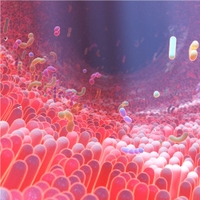
Modifying the gut microbiome may aid recovery from post-acute COVID-19 (PACS), or long COVID, with new research demonstrating a strong association between gut dysbiosis and persistent symptoms in patients with COVID-19 up to six months after virus clearance (1).
With an increasing population of patients recovering from severe acute respiratory syndrome coronavirus 2 (SARS-CoV-2) infection, there is significant interest in understanding and treating the phenomenon of ‘long COVID’ or PACS, a collection of mild to debilitating symptoms that persist weeks to months after initial infection (2).
The exact cause of long COVID is yet to be elucidated; however, possible contributing factors include excessive immune response, ongoing inflammation, cellular damage during acute infection, and physical effects of severe illness (2). In addition, a recent study identified four factors potentially involved in causing long COVID (3):
- Type 2 diabetes
- Reactivation of Epstein-Barr virus
- Presence of specific autoantibodies
- Circulating mRNA fragments of SARS-CoV-2 in the blood (RNAaemia).
Previous research has found that individuals who experience severe COVID-19 tend to have gut dysbiosis, characterised by reduced microbiota diversity, increased abundance of opportunistic pathogens, and fewer gut commensals with immunomodulatory effects (4,5,6). Furthermore, gut dysbiosis may persist well after virus clearance and has been linked to disease severity, impaired pulmonary function, and inflammatory reaction in follow-up studies of COVID-19 patients at 3 and 6 months (7).
The current prospective study included 106 patients who had been hospitalised with mild to severe COVID-19 and 68 controls without COVID-19. The participants gave stool samples on admission and at 1 month and 6 months after discharge from hospital. Shotgun metagenomic sequencing was used to analyse microbiota from 258 stool samples, and the results correlated with symptoms at 6 months.
Following their discharge from the hospital, 81% of people still had at least one lingering symptom 3 months later. After 6 months, 76% still had at least one symptom, with fatigue (31.3%), poor memory (28.3%), hair loss (21.7%), anxiety (20.8%) and difficulty in sleeping (20.8%) being the most common symptoms.
Researchers found no association between the viral load in the samples provided at admission to the hospital and whether participants developed long COVID. However, the gut microbiota composition at admission was associated with the occurrence of long COVID. Patients without long COVID showed a recovered gut microbiome at 6 months, comparable to non-COVID-19 controls.
Higher levels of Ruminoccocus gnavus and Bacteroides vulgaris characterised the gut microbiome of patients with long COVID. These bacteria are often associated with inflammatory diseases. These patients also had lower levels of Faecalibacterium prausnitzii which is known to have immunomodulatory properties and can contribute to host immune defence, including downregulating inflammatory responses (8,9).
Persistent respiratory symptoms were correlated with opportunistic gut pathogens, including Streptococcus anginosus, Streptococcus vestibularis, Streptococcus gordonii and Clostridium disporicum. Neuropsychiatric symptoms and fatigue were correlated with nosocomial gut pathogens, including Clostridium innocuum and Actinomyces naeslundii. Patients who had persistent hair loss at 6 months were significantly depleted in butyrate-producing species compared with non-COVID-19 controls.
Loss of several symbionts, including the genera Bifidobacteria, Roseburia and Faecalibacteria, were showed the largest inverse correlations with long-COVID at 6 months. These bacteria are short-chain fatty acid producers and play significant roles in maintaining immune homeostasis (9,10).
Restoring the gut microbiome
The association between a persistently altered gut microbiome and long-term sequelae of COVID-19, together with emerging evidence from small clinical trials with probiotics in patients with long COVID, suggests that there is an opportunity to ameliorate these long-lasting symptoms by regulating the gut microbiome.
In a recent experimental study, supplementation with a lactobacillus probiotic blend ![]() and inulin for 30 days significantly improved gastrointestinal symptoms, cough, fatigue, and subjective wellbeing scores in patients with long COVID (average symptom length of 120 days) (11). In addition, participants who were more likely to have gut dysbiosis at trial entry, such as sedentary, hospitalised, older males with GI symptoms, had a statistically significantly better response to the probiotics.
and inulin for 30 days significantly improved gastrointestinal symptoms, cough, fatigue, and subjective wellbeing scores in patients with long COVID (average symptom length of 120 days) (11). In addition, participants who were more likely to have gut dysbiosis at trial entry, such as sedentary, hospitalised, older males with GI symptoms, had a statistically significantly better response to the probiotics.
In a randomised controlled trial of 200 patients with post-COVID fatigue, oral supplementation with a probiotic and systemic enzyme complex ![]() for 14 days resulted in resolution of fatigue in a greater percentage of subjects in the test compared with the control arm (91% vs. 15%) (12). Supplementation significantly reduced all physical fatigue symptoms, such as energy level, muscle strength and feeling of weakness, and mental fatigue symptoms, including difficulty concentrating, ability to focus or think clearly and memory difficulties, all of which have been described as brain fog.
for 14 days resulted in resolution of fatigue in a greater percentage of subjects in the test compared with the control arm (91% vs. 15%) (12). Supplementation significantly reduced all physical fatigue symptoms, such as energy level, muscle strength and feeling of weakness, and mental fatigue symptoms, including difficulty concentrating, ability to focus or think clearly and memory difficulties, all of which have been described as brain fog.
Limitations and conclusion
While this is a small observational study, and therefore unable to establish causation, the findings provide new insights into the complex association between the gut microbiome and the long-term sequelae after COVID- 19 infection. Considering the millions of people infected with SARS-CoV-2, future research regarding the mechanisms of disease underlying long COVID are urgently required, as well as clinical trials of potential therapies and dietary interventions targeting the gut microbiota.






